The AMD 3rd Gen Ryzen Deep Dive Review: 3700X and 3900X Raising The Bar
by Andrei Frumusanu & Gavin Bonshor on July 7, 2019 9:00 AM EST** = Old results marked were performed with the original BIOS & boost behaviour as published on 7/7.
Benchmarking Performance: CPU Office Tests
The Office test suite is designed to focus around more industry standard tests that focus on office workflows, system meetings, some synthetics, but we also bundle compiler performance in with this section. For users that have to evaluate hardware in general, these are usually the benchmarks that most consider.
All of our benchmark results can also be found in our benchmark engine, Bench.
PCMark 10: Industry Standard System Profiler
Futuremark, now known as UL, has developed benchmarks that have become industry standards for around two decades. The latest complete system test suite is PCMark 10, upgrading over PCMark 8 with updated tests and more OpenCL invested into use cases such as video streaming.
PCMark splits its scores into about 14 different areas, including application startup, web, spreadsheets, photo editing, rendering, video conferencing, and physics. We post all of these numbers in our benchmark database, Bench, however the key metric for the review is the overall score.
We're investigating the PCMark results, which seem abnormally high.
Update: We can't do a direct comparison due to the lack of a RX460 for PCMark for the moment
3DMark Physics: In-Game Physics Compute
Alongside PCMark is 3DMark, Futuremark’s (UL’s) gaming test suite. Each gaming tests consists of one or two GPU heavy scenes, along with a physics test that is indicative of when the test was written and the platform it is aimed at. The main overriding tests, in order of complexity, are Ice Storm, Cloud Gate, Sky Diver, Fire Strike, and Time Spy.
Some of the subtests offer variants, such as Ice Storm Unlimited, which is aimed at mobile platforms with an off-screen rendering, or Fire Strike Ultra which is aimed at high-end 4K systems with lots of the added features turned on. Time Spy also currently has an AVX-512 mode (which we may be using in the future).
For our tests, we report in Bench the results from every physics test, but for the sake of the review we keep it to the most demanding of each scene: Ice Storm Unlimited, Cloud Gate, Sky Diver, Fire Strike Ultra, and Time Spy.
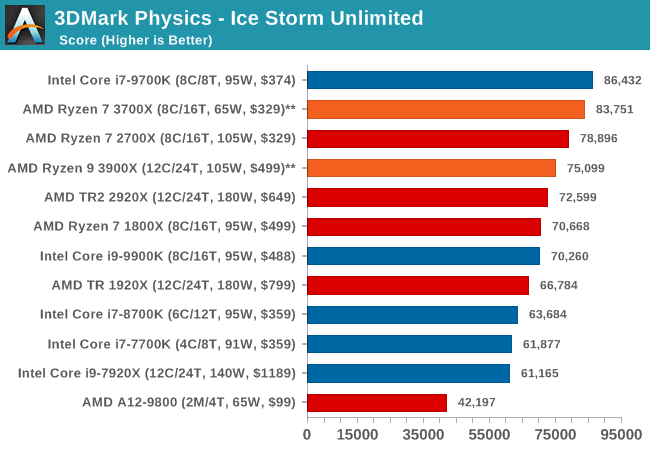
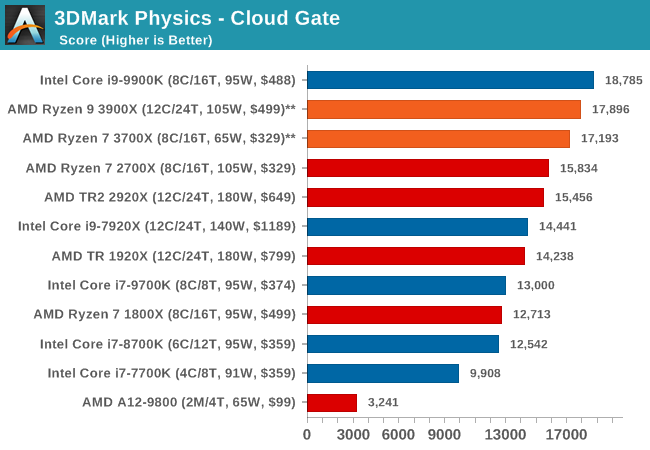
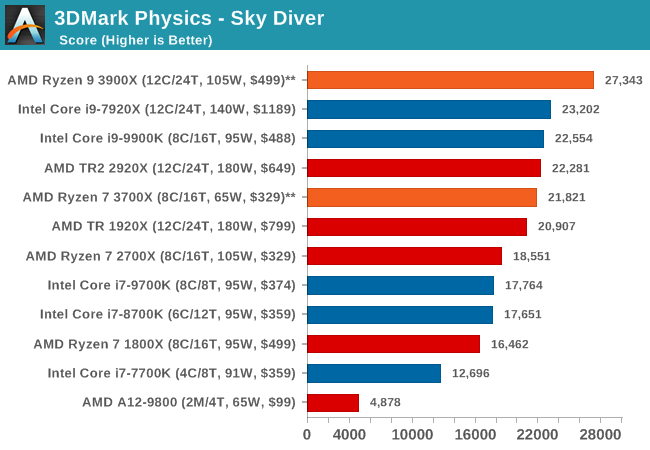
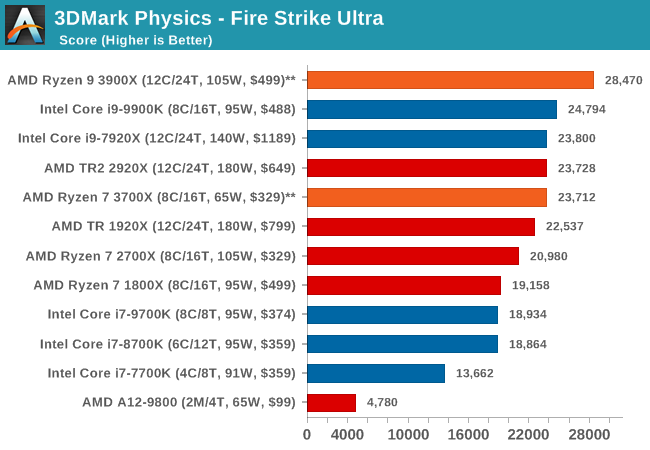
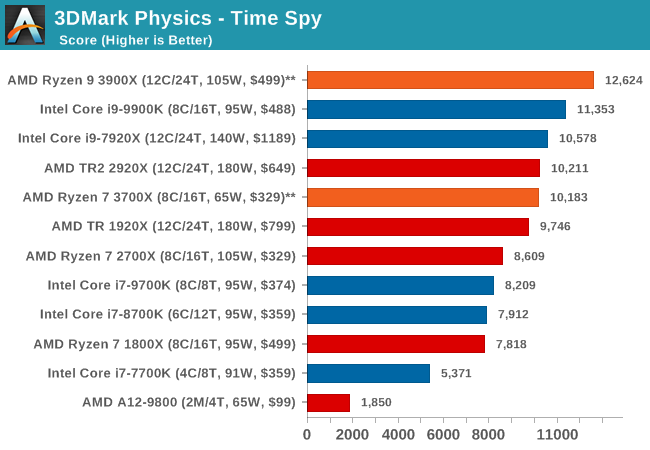
The older Ice Storm test didn't much like the Core i9-9900K, pushing it back behind the R7 1800X. For the more modern tests focused on PCs, the 9900K wins out. The lack of HT is hurting the other two parts.
GeekBench4: Synthetics
A common tool for cross-platform testing between mobile, PC, and Mac, GeekBench 4 is an ultimate exercise in synthetic testing across a range of algorithms looking for peak throughput. Tests include encryption, compression, fast Fourier transform, memory operations, n-body physics, matrix operations, histogram manipulation, and HTML parsing.
I’m including this test due to popular demand, although the results do come across as overly synthetic, and a lot of users often put a lot of weight behind the test due to the fact that it is compiled across different platforms (although with different compilers).
We record the main subtest scores (Crypto, Integer, Floating Point, Memory) in our benchmark database, but for the review we post the overall single and multi-threaded results.
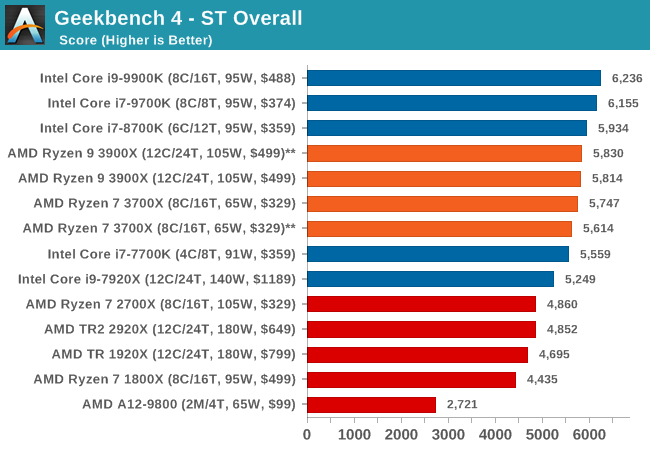
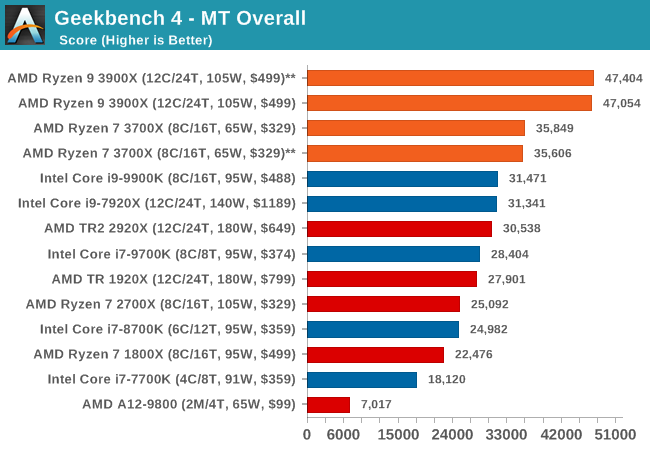










447 Comments
View All Comments
sor - Sunday, July 7, 2019 - link
Nobody has final motherboard firmwares for these. We will see what they are capable of in the coming weeks.Maxiking - Sunday, July 7, 2019 - link
Those cpus don't even POST past 4.3ghz, so no, firmware isn't the problem and never was and it never improved OC-ing, only compatibility and made systems more stable. They reached the limit of the node.Oliseo - Sunday, July 7, 2019 - link
"Those cpus don't even POST past 4.3ghz, so no, firmware isn't the problem and never was and it never improved OC-ing, only compatibility and made systems more stable. They reached the limit of the node."Like you've reached the limit of your ability to speak in a way that others can make sense of? Perhaps you need to focus on that rather than whatever multinationals are up to you're trying to defend. It will do you more good in the long term, trust that.
RSAUser - Monday, July 8, 2019 - link
Sorry what? There are benchmarks out showing 5 GHz all core on the 3900X, that is with nitrogen, but I'm expecting at least 4.8GHz possible.Intel is worse per clock than AMD with the new node, plus AMD has about 105W to play with on the 3900X to match the power usage of the 9900K on all core.
TEAMSWITCHER - Tuesday, July 9, 2019 - link
4.8GHz won’t happen.RSAUser - Thursday, July 11, 2019 - link
There are reddit posts showing 4.8 on all-core, air, you'll see more posts about that soon.DigitalFreak - Sunday, July 7, 2019 - link
@maxking So you call out trolls while being one yourself.Maxiking - Sunday, July 7, 2019 - link
The only troll here is AMD. They advertise 4,6ghz boost while reaching 4.2 ghz and 4.3 ghz max when manually OC-ed. This is called false advertising and fraud.Oxford Guy - Sunday, July 7, 2019 - link
But we'll ignore having to completely disable hyperthreading on Intel's hyperthreading-advertised CPUs.Phynaz - Sunday, July 7, 2019 - link
You keep repeating this as if by doing so it will somehow become true.